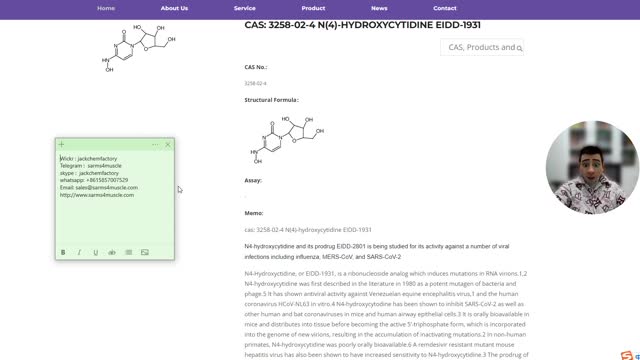Premium Only Content

cas: 3258-02-4 N(4)-hydroxycytidine EIDD-1931
cas: 3258-02-4 N(4)-hydroxycytidine EIDD-1931
N4-hydroxycytidine and its prodrug EIDD-2801 is being studied for its activity against a number of viral infections including influenza, MERS-CoV, and SARS-CoV-2
N4-Hydroxyctidine, or EIDD-1931, is a ribonucleoside analog which induces mutations in RNA virions.1,2 N4-hydroxycytidine was first described in the literature in 1980 as a potent mutagen of bacteria and phage.5 It has shown antiviral activity against Venezuelan equine encephalitis virus,1 and the human coronavirus HCoV-NL63 in vitro.4 N4-hydroxycytodine has been shown to inhibit SARS-CoV-2 as well as other human and bat coronaviruses in mice and human airway epithelial cells.3 It is orally bioavailable in mice and distributes into tissue before becoming the active 5’-triphosphate form, which is incorporated into the genome of new virions, resulting in the accumulation of inactivating mutations.2 In non-human primates, N4-hydroxycytidine was poorly orally bioavailable.6 A remdesivir resistant mutant mouse hepatitis virus has also been shown to have increased sensitivity to N4-hydroxycytidine.3 The prodrug of N4-hydroxycytidine, EIDD-2801, is also being investigated for its broad spectrum activity against the coronavirus family of viruses.3
N4-Hydroxycytidine (3258-02-4) was originally identified as a mutagen effecting AT to GC base-pair transitions.1 It has also been found to have antiviral properties against a broad range of viruses including hepatitis C2, norovirus3, Ebola virus4, Chikungunya virus5, influenza and respiratory syncytial viruses6, and importantly, coronaviruses.7,8 N4-hydroxycytidine is the active molecule in the antiviral pro-drug clinical candidate EIDD-2801
-
 1:13:08
1:13:08
MTNTOUGH Fitness Lab
22 hours agoJim Burgen: The Hard Truth About Leading Men | MTNPOD#113
33.8K4 -
 37:59
37:59
BibleUnbound
19 hours agoThe Complete Story of John: The Apostle | How to Love Like Christ
20.3K8 -
 56:22
56:22
Vedic compatability astrology
15 hours ago"From Death to Divine: My Awakening, Healing & Soul Path Revealed"
26.2K2 -
 8:54
8:54
VSOGunChannel
14 hours ago $3.24 earnedBREAKING: Anti Gun Activist Megan Bennett Removed from ATF
57K18 -
 12:38
12:38
China Uncensored
16 hours agoTaiwan is DONE With China
44.9K50 -
 22:03
22:03
SantaSurfing
13 hours ago4/21/2025 - Pope is gone! How the world is changing for the good! Trump bring religion back!
45.8K38 -
 1:01:30
1:01:30
Trumpet Daily
21 hours ago $9.04 earnedEurope’s Religious Revival - Trumpet Daily | Apr. 21. 2025
42.2K7 -
 34:52
34:52
Steph & Kayls
16 hours ago $1.60 earnedToys In The Bedroom: Fun, Fantasy, or Too Far? | Ep. 3
22.1K9 -
 2:03:22
2:03:22
Badlands Media
18 hours agoBaseless Conspiracies Ep. 129: Vatican Black Ops, Red Shoes, and the Financial Empire of the Popes
194K59 -
 2:39:38
2:39:38
TimcastIRL
13 hours agoMS-13 Story BURNS Democrats, Media PANICS Tries To Get Off Immigration Story | Timcast IRL
262K1.19K